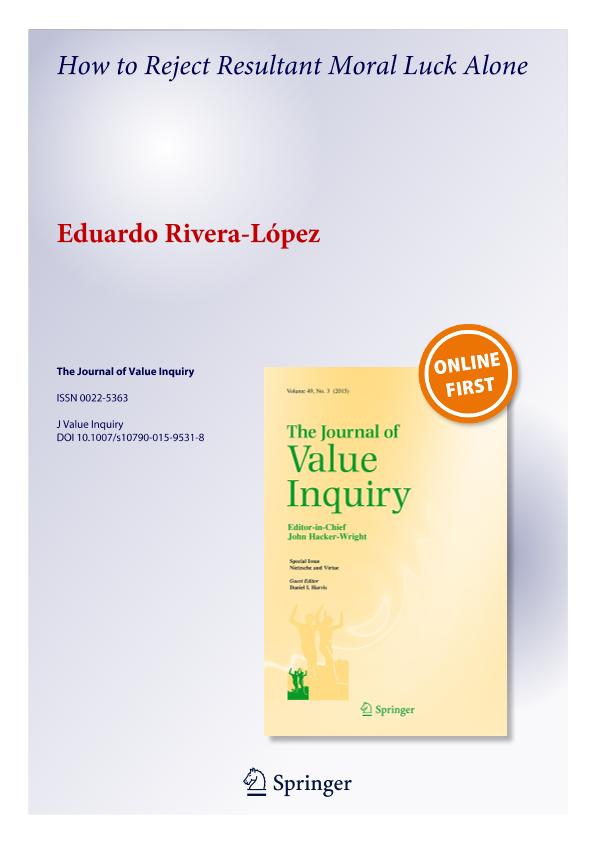Mostrar el registro sencillo del ítem
dc.contributor.author
Rivera López, Eduardo Enrique

dc.date.available
2020-05-22T15:30:46Z
dc.date.issued
2016-06
dc.identifier.citation
Rivera López, Eduardo Enrique; How to Reject Resultant Moral Luck Alone; Springer; The Journal of Value Inquiry; 50; 2; 6-2016; 415-423
dc.identifier.issn
1573-0492
dc.identifier.uri
http://hdl.handle.net/11336/105750
dc.description.abstract
Thomas Nagel famously distinguishes four kinds of moral luck (in which factorsbeyond our control nevertheless have bearing on our moral responsibility).Threeof these are antecedent to our actions: constitutive luck (our character traits), remote causal conditions (being born in a certain time and place, for example), and circumstantial luck (the circumstances in which we act). The remaining kind of moral luck, resultant luck, concerns the results of our actions: the fact that our negligent or intentional actions produce a particular outcome or not often depends on whether some uncontrollable facts occur. Many think that resultant moral luck does not exist, because we cannot be blamed more or less depending on facts that are entirely beyond our control. The problem with this argument is that the other three kinds of moral luck (though I will focus specifically on circumstantial luck) have exactly the same feature: our responsibility also depends on whether certain (antecedent) uncontrollable facts hold. However, rejecting all kinds of moral luck is, as we will see, a bold and implausible move. My goal is to take some initial steps in defense of the motto: circumstantial (and all other kinds of antecedent) moral luck, Yes; resultant moral luck, No. My argument does not amount to proof that resultant moral luck does not exist. I merely try to show that rejecting resultant luck while accepting circumstantial luck is not necessarily inconsistent or unmotivated.
dc.format
application/pdf
dc.language.iso
eng
dc.publisher
Springer

dc.rights
info:eu-repo/semantics/openAccess
dc.rights.uri
https://creativecommons.org/licenses/by-nc-sa/2.5/ar/
dc.subject
MORAL LUCK
dc.subject
MORAL RESPONSIBILITY
dc.subject
CIRCUMSTANTIAL LUCK
dc.subject.classification
Ética

dc.subject.classification
Filosofía, Ética y Religión

dc.subject.classification
HUMANIDADES

dc.title
How to Reject Resultant Moral Luck Alone
dc.type
info:eu-repo/semantics/article
dc.type
info:ar-repo/semantics/artículo
dc.type
info:eu-repo/semantics/publishedVersion
dc.date.updated
2020-05-20T14:35:34Z
dc.identifier.eissn
0022-5363
dc.journal.volume
50
dc.journal.number
2
dc.journal.pagination
415-423
dc.journal.pais
Países Bajos

dc.journal.ciudad
Amsterdam
dc.description.fil
Fil: Rivera López, Eduardo Enrique. Universidad Torcuato Di Tella; Argentina. Consejo Nacional de Investigaciones Científicas y Técnicas; Argentina
dc.journal.title
The Journal of Value Inquiry
dc.relation.alternativeid
info:eu-repo/semantics/altIdentifier/doi/http://dx.doi.org/10.1007/s10790-015-9531-8
dc.relation.alternativeid
info:eu-repo/semantics/altIdentifier/url/https://link.springer.com/article/10.1007/s10790-015-9531-8
Archivos asociados
